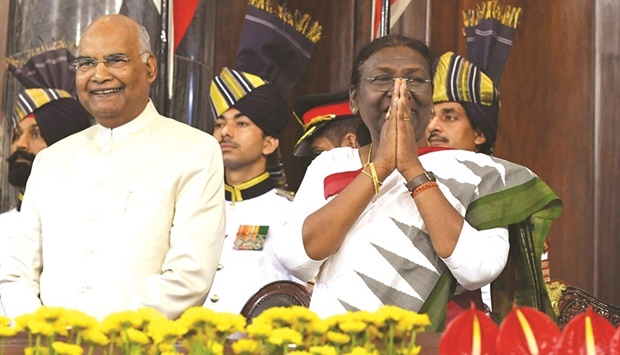• The poor in India can dream, says president
Droupadi Murmu was sworn in as India’s president yesterday, making her the first person from one of the country’s marginalised tribal communities to serve as head of state.
The former schoolteacher and state governor was elected to the largely ceremonial position last week with 64% of the vote by members of India’s parliament and state assemblies.
Murmu, who is from the Santhal tribe and was born in eastern Odisha state, paid her respects before her inauguration at a memorial dedicated to India’s independence hero Mahatma Gandhi in New Delhi.
“I started my life journey from a small tribal village,” Murmu, 64, said after taking the oath of office in parliament. “From the background I come from, it was like a dream for me to even get elementary education.”
“But despite many obstacles, my resolve remained strong and I became the first daughter from my village to go to college,” she added.
Murmu’s elevation to India’s highest constitutional post has been seen as an important gesture of goodwill by Prime Minister Narendra Modi to the communities that make up more than 8% of its 1.4bn people ahead of a general election due by 2024.
Her win was considered a certainty because of the strength of the ruling Bharatiya Janata Party (BJP) and its allies in the parliament and state assemblies.
“Her assuming the presidency is a watershed moment for India especially for the poor, marginalised and downtrodden,” Modi said on Twitter after Murmu’s address.
Murmu said her election would give hope to those left behind by India’s recent economic growth.
“My election is proof of the fact that the poor in India can have dreams and fulfil them too,” Murmu, 64, said in a speech in parliament after taking the oath of office. “It is a matter of great satisfaction for me that those who have been deprived for centuries and those who have been denied the benefits of development, those poor, downtrodden, backwards and tribals are seeing their reflection in me.”
India’s prime minister wields executive power, but the president can send back some parliamentary bills for reconsideration and also plays a guiding role in the process of forming governments.
India’s president also acts as the Supreme Commander of the Armed Forces.
Murmu is the country’s second woman president, after Pratibha Patil, who held the position for five years from 2007.
She succeeds Ram Nath Kovind, the second president from the Dalit community, the bottom of the Hindu caste system.
Chinese President Xi Jinping was among the world leaders to congratulate Murmu and said that he is “ready to work” with his new Indian counterpart to strengthen relations, according to Chinese state media.
Relations between the world’s two most populous nations have been frosty since a deadly Himalayan military stand-off between the countries in 2020.
Both sides have since reinforced their disputed border with extra soldiers, military hardware and new infrastructure, and multiple rounds of military and diplomatic talks have failed to de-escalate tensions.

